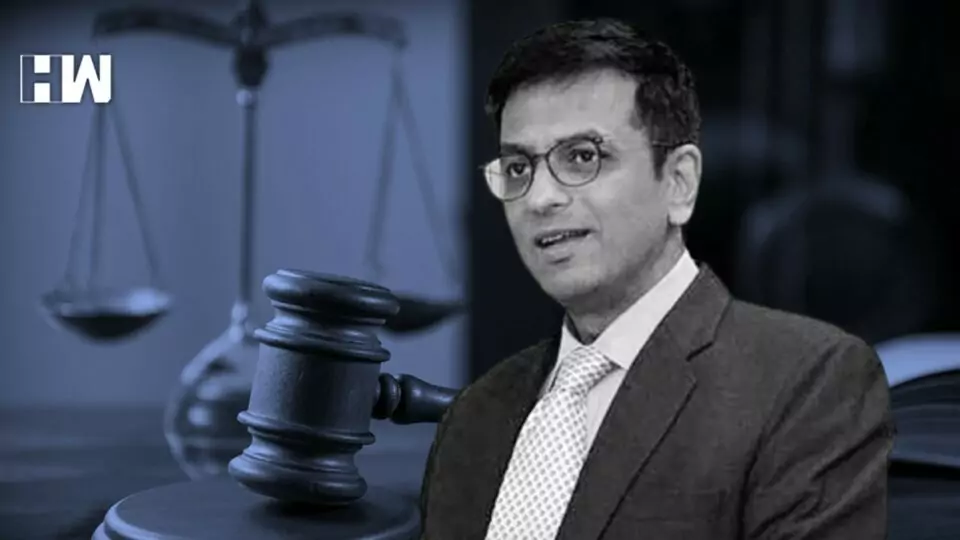DY Chandrachud served as the Additional Solicitor General of India from 1998 to 2000. As an advocate, Justice Chandrachud’s most significant cases have involved constitutional and administrative law, the rights of HIV+ workers, religious and linguistic minority rights, and labor and industrial laws.
The government on Friday wrote to Chief Justice of India Uday Umesh Lalit to name his successor, a report said. Justice DY Chandrachud is the senior-most judge after the CJI and he is likely to be the 50th CJI after UU Lalit who will serve office till November 8.
During his Supreme Court service, he has been on the highest number of Constitution Benches (five judges or more) constituted to hear matters on constitutional questions. During his tenure at the Supreme Court, he has delivered judgments on Indian constitutional law, comparative constitutional law, human rights, gender justice, public interest litigation, commercial law, and criminal law.
Who is DY Chandrachud?:
Son of India’s longest-serving chief justice, YV Chandrachud, Justice Dhananjaya Yeshwant Chandrachud completed his LLB at Delhi University. He then studied at Harvard University after receiving the prestigious Inlaks Scholarship. At Harvard, he completed his Masters in Law (LLM) and Doctorate in Juridical Sciences (SJD).
Also Read: Bharat Jodo Yatra: Rahul Gandhi Ties Mother Sonia’s Shoelaces
Justice Chandrachud practiced as an advocate in the Supreme Court and the High Courts of Gujarat, Calcutta, Allahabad, Madhya Pradesh, and Delhi before becoming a judge of the Bombay High Court.
He appeared before the Company Law Board, the Monopolies & Restricted Trade Practices (MRTP) Commission, the Foreign Exchange Regulation Act (FERA) Board, and National and State Commissions. He was designated as a Senior Advocate by the Bombay High Court in 1998.
DY Chandrachud served as the Additional Solicitor General of India from 1998 to 2000. As an advocate, Justice Chandrachud’s most significant cases have involved constitutional and administrative law, the rights of HIV+ workers, religious and linguistic minority rights, and labor and industrial laws.
In the year 2000, he was appointed as an Additional Judge of the Bombay High Court. He took oath as the Chief Justice of Allahabad High Court on 31 October 2013.
Landmark Judgements:
According to a report by supreme court observer, His concurring opinion in Shafin Jahan v Ashokan K.M. upheld Hadiya’s choice of religion and marriage partner. Hadiya had converted to Islam and married the petitioner Shafin Jahan, at which point her parents alleged that she had been brainwashed. Justice Chandrachud reiterated that an adult’s right to make decisions in marriage or religion falls within her zone of privacy.
In Joseph Shine v Union of India, Justice Chandrachud concurred with the majority opinion in decriminalizing adultery. He found that section 497 IPC violated Articles 14, 15, and 21 of the Constitution. He read down section 198(2) CrPC. He opined that decriminalizing adultery was rooted in patriarchal notions and had resulted in centuries of female subjugation.
Overturned Father’s Judgement: Justice DY Chandrachud has overturned his father YV Chandrachud’s decision not once but twice.
In 1985, the then CJI YV Chandrachud along with Justices RS Pathak and AN Sen upheld the validity of Section 497. Justice YV Chandrachud wrote the Sowmithri Vishnu judgment.
Justice YV Chandrachud wrote, “It is commonly accepted that it is the man who is the seducer and not the woman. This position may have undergone some change over the years but it is for the legislature to consider whether Section 497 should be amended appropriately so as to take note of the transformation which society has undergone”.
Three decades later, his son Justice DY Chandrachud while hearing the case in August this year took a dig saying, We must make our judgments relevant to the present day.
It is common to find instances of working women, who take care of the home, getting beaten up by their husbands, who don’t earn. She wants a divorce. But the matter remains pending in court for years. If she looks for love, affection, and solace in another man, can she be deprived of it,” asked Justice DY Chandrachud?
Justice DY Chandrachud also remarked, “Very often, adultery happens when the marriage has already broken down and the couple is living separately. If either of them indulges in sex with another person, should it be punished under Section 497?”
Referring To Father’s Judgement As Flawed: in 1976, a five-judge bench had dismissed the argument that privacy constituted the fundamental right under right to life.
Two judgments were delivered in the ADM Jabalpur case by the Supreme Court bench comprising the then CJI AN Ray and Justices YV Chandrachud, PN Bhagwati, MH Beg, and HR Khanna.
MH Beg authored the majority judgment concurred by CJI and Justices Chandrachud and Bhagwati. Justice HR Khanna wrote a dissenting judgment favoring privacy a fundamental right.
Four decades later, Justice DY Chandrachud wrote, “The judgments rendered by all the four judges constituting the majority in ADM Jabalpur are seriously flawed.”
Justice Chandrachud lauded the dissenting judge in the ADM Jabalpur case saying, “Justice Khanna was clearly right in holding that the recognition of the right to life and personal liberty…”
He said that the people of India did not surrender life, liberty, and freedom to the state by adopting the Constitution.
“Life and personal liberty are not creations of the Constitution. These rights are recognized by the Constitution as inhering in each individual as an intrinsic and inseparable part of the human element which dwells within,” Justice DY Chandrachud said while announcing the privacy judgment.
Justice DY Chandrachud will serve as CJI for 2 years from November 09 2022 to November 10, 2022, and next in line to be CJI is Sanji Khanna.
As an independent media platform, we do not take advertisements from governments and corporate houses. It is you, our readers, who have supported us on our journey to do honest and unbiased journalism. Please contribute, so that we can continue to do the same in future.

